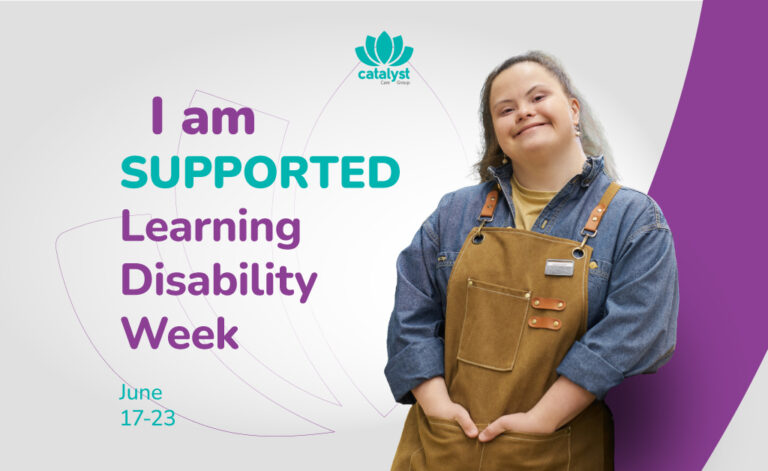Catalyst Care Group implements positive behaviour support (PBS) to improve the quality of life of people who display or are at risk of displaying challenging behaviours. Behavioural challenges and PBS are closely intertwined, showing incredible results when supporting children, adults and older people with complex care needs.
What Behaviours Are Considered Challenging?
Challenging behaviour is an umbrella term that describes a range of actions that might adversely affect individuals or people around them. In health and social care, challenging behaviour occurs when people with learning disabilities, autism or mental-ill health are trying to express unmet needs or when trying to communicate intense emotions like fear, distress or pain.
Challenging behaviour can be displayed in a number of different ways, including:
- Hurting others by hitting, hair-pulling, head-butting
- Destructive behaviours such as breaking objects, throwing things, tearing things up
- Eating inedible objects like wood, chalk, or pen lids
- Self-harm like head banging, hand biting, eye poking
- Other behavioural difficulties like spitting, taking clothes off in public
Importance of Positive Behaviour Support in Management of Behaviours That Challenge
Positive behaviour support (PBS) is an evidence-based framework utilised to address behaviour that challenges. It’s based on applied behaviour analysis (ABA), a scientific approach to understanding behaviour. The main goal of PBS practice is to empower people to develop communication and social skills and learn to express their needs more efficiently. With a lack of understanding and access to proper care and support, challenging behaviour may exacerbate in time, causing negative consequences for the individual and their family.
Positive behaviour support puts the individual first and helps us understand and address the needs and triggers that lead to challenging behaviours. The goal is to improve a person’s quality of life through a person-centred approach and positive reinforcement practices. PBS is based on using proactive interventions, focused on adapting the environment for the person’s need, rather than simply targeting the challenging behaviour.
PBS does not imply the use of force to prevent or stop specific behaviours; it’s committed to using a proactive approach that will minimise triggering behaviours of concern. All PBS care plans and strategies need to be aligned with the person and their family’s desires. In many cases, PBS puts the person at the centre of their care planning, empowering them to make choices and decisions regarding the care dynamics.
Positive behaviour support is founded on principles involving inclusion, choice, participation and equal opportunity. Additionally, we focus on identifying and developing people’s skills, striving to enable people to do things independently, with appropriate support.
Implementing PBS for Behavioural Challenges
PBS is person-centred and requires ongoing assessment, collaboration, and flexibility to achieve the best outcomes for individuals facing behavioural challenges. Consulting with professionals experienced in PBS can offer valuable guidance while managing an individual’s challenging behaviour.
The first and most important step involves creating a positive behaviour support plan tailored to the person’s unique needs and desires.
Implementing positive behaviour support (PBS) for behaviour that challenges involve:
- Understanding the reasons behind the behaviour
- Creating a tailored plan with positive strategies
- Implementing it consistently with support and training
- Regularly evaluating its effectiveness
- Ensuring consistent application across environments
- Continuously learning and adapting for improvement
Collaboration among caregivers, educators, and professionals is crucial throughout this process to create a holistic and effective support system.
What Strategies Are Used in PBS to Manage Challenging Behaviour?
Positive behaviour interventions involve two main strategies depending on a complex set of factors. The nature of the PBS approach is to prioritise proactive strategy, reduce reactive strategies, and prevent restrictive measures.
Proactive Strategies:
- Preventive Measures: Focus on preventing challenging behaviours by creating supportive environments, establishing clear routines, and setting up individuals for success
- Teaching Alternative Behaviours: Teach and reinforce positive behaviours to replace the challenging ones. This proactive approach aims to equip individuals with the skills they need to navigate situations differently
- Environmental Modifications: Alter the environment to minimise triggers and create a setting that supports positive behaviour. This might include changes in seating, lighting, noise levels, and the availability of visual supports
- Clear Expectations and Structure: Establish clear expectations and consistent routines to provide structure and predictability, reducing anxiety and the likelihood of challenging behaviours
- Skill Building: Provide individuals with the necessary skills to manage emotions, communicate effectively, and self-regulate, empowering them to handle situations more successfully
Reactive Strategies:
- Crisis De-escalation Techniques: Employ techniques to de-escalate situations when challenging behaviours occur, ensuring safety and calming the individual
- Immediate Support: Provide immediate support and guidance to redirect behaviour, offering alternatives or interventions to address the situation
- Consistent Response: Ensure responses to challenging behaviours are consistent and aligned with the established support plan, avoiding punitive measures
PBS emphasises proactive strategies to prevent challenging behaviours before they occur, focusing on teaching new skills and creating environments conducive to positive behaviour. Reactive strategies are used when challenging behaviours manifest, aiming to manage the situation effectively while staying consistent with the overall positive support plan. The goal is to minimise the occurrence of challenging behaviours by addressing underlying causes and promoting positive alternatives.

The Role of Caregivers in PBS
Our support workers and clinicians play a crucial role in implementing positive behaviour support (PBS) by instilling hope, compassion and empathy while providing holistic, person-centred support to people with complex care needs.
- Compassion and Empathy: Caregivers who approach their roles with compassion and empathy create a nurturing and understanding environment. This mindset allows them to connect with individuals, acknowledging their challenges and emotions without judgment. Compassionate caregivers foster trust and rapport, which is essential for effective support.
- Holistic Support: Caregivers in PBS consider the individual’s overall well-being. They address the challenging behaviours, underlying causes, and the person’s holistic needs—physical, emotional, social, and environmental. This approach ensures a comprehensive and supportive response.
- Person-Centred Approach: Caregivers focus on the individual’s unique strengths, preferences, and goals. They involve the individual in decision-making, tailoring support plans to align with their interests and capabilities. This person-centred approach respects autonomy and fosters a sense of empowerment.
- Collaboration and Consistency: Caregivers collaborate with other professionals, family members, and support networks to ensure a unified and consistent approach. Consistency across various environments and interactions provides stability and reinforces positive behaviours.
- Advocacy and Understanding: Caregivers advocate for individuals by understanding their perspectives and needs. They actively listen, observe, and communicate effectively to support the individual’s best interests, ensuring that support plans are adaptive and responsive.
- Continual Learning and Growth: Caregivers engage in ongoing learning and self-improvement to enhance their understanding of PBS principles and refine their support strategies. They stay updated on best practices and are open to adapting their approaches as needed.
- Positive Reinforcement and Encouragement: Caregivers consistently reinforce positive behaviours, providing encouragement and acknowledgement. Celebrating achievements, no matter how small, fosters motivation and a positive environment.
In essence, caregivers serve as advocates and allies, embodying empathy, understanding, and support. Their compassionate and person-centred approach addresses challenging behaviours and nurtures a supportive environment conducive to personal growth and positive outcomes.
Catalyst Care Group Brands are PBS Certified
At Catalyst Care Group, we aim to support and serve people in need of proactive and person-centred care. We understand the value of positive behaviour support and witness the difference that PBS has on people’s lives daily.
Our clinicians are trained in PRO-ACT SCIPr, a ‘whole approach’ to supporting individuals with or at risk of displaying behaviour that challenges. This individualised approach emphasises proactive approaches to minimise the need for reactive strategies.
Our positive behaviour support team can provide a range of services to the people we support, their families and support staff. These include functional assessment of challenging behaviours, evidence-based support strategies and positive behaviour support plans. We also provide debriefing and emotional support for our clinician to protect their well-being.
Whether you want to learn more about positive behaviour support or discover how we can help you, please get in touch with our team, who are ready to guide you or your loved one on your next healing journey.
FAQs
Can PBS be Used for a Wide Range of Behavioural Challenges?
Yes. At Catalyst Care Group, we use the PBS approach to support individuals with autism spectrum disorder, learning disabilities, mental health needs and complex care needs.
Is PBS Effective for Adults with Behavioural Challenges?
Positive behaviour support implements evidence-based practices to improve the quality of care for children, adults, and older people with complex care needs using a person-centred and outcome-based approach.
Does Catalyst Care Group offer PBS Training to its employees?
Catalyst Care Group offers positive behaviour support (PBS) and PROACT- SCIPr training for all our clinicians and support workers who provide care and support in community-based settings. This training program is mandatory for all care practitioners in the field.










